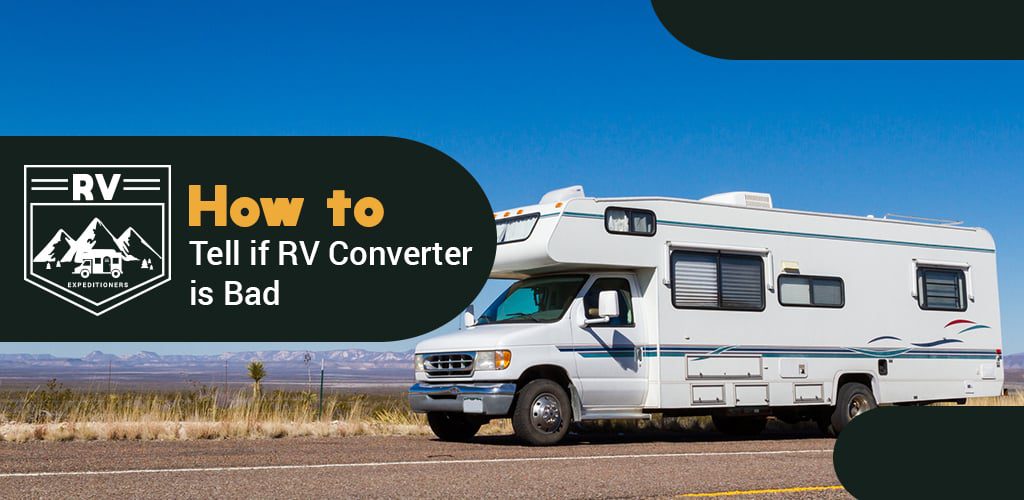There’s absolutely nothing like heading out in the wild blue yonder with your RV. It’s a great feeling to be able to travel through the mountain areas and woodland to camp, hike and fish, knowing that your RV is more than capable of providing heat and electricity.
But everything breaks eventually, and your RV’s converter is not immune to wear and tear. While there are normally plenty of warning signs before something breaks, a lot of you might not know what to look for when the converter starts to go. Check out the info below to find out how to tell if your RV converter is bad.
What Exactly Does an RV Converter Do Anyway?
The converter in your RV is one of the most important components you can have. All of the electricity produced by the RV batteries are run through the converter in order to “convert” AC current (110 Volts) to DC current (12 Volts).
DC current runs most of the equipment in your RV such as your lights, stoves and even your water pumps. AC current is rarely used at all except for running your big flat screen TV and of course the air conditioning units.
How Can I Tell if My Converter is Bad?
Converter seems to drain the battery
- In order for the batteries to keep a constant charge, the converter must be able to charge them in the first place. If your batteries don’t seem to hold a charge, your converter might be the problem.
Check To See if Your Cooling Fan Is Malfunctioning
- You might be experiencing a problem with your cooling fan’s heatsink.
Circuit Board or Circuit Breakers Can Tell You if You Have a Bad Converter
- Sometimes you might be running too many appliances or other components. This could lead to overloading.
Resistors or Diodes Can Play a Big Role in How Your Converter Works
- Some, but not all RV converters have resistors and diodes. These components help to conduct electrical power so that the converter can properly regulate the power going through it.
Could It Be a Problem With a Fuse?
- If too much power starts to come through the converter, the fuse will basically burn itself out to protect the main components.
What About the 110 Power Source?
- Your 110 Volt power source is what your appliances are going to plug into. Without it, there’s no other way for your components to get power.
RV Converter Troubleshooting
Check the Battery on the Monitor Panel
All RV batteries will simply die over time. Some simple reasons for this are:
- Old age - most batteries never last beyond the five-seven year mark.
- Low charge - this will occur if the battery isn't charged over the winter season for instance.
- Dead cell - If even one cell is dead in a battery, it won’t be long before you see decreased power.
Normally you can just check your RV battery monitor located on your dash to see if you're having battery problems. Plus, nearly any auto garage can also check the battery for problems.
Check for Blown Fuses
This is one of the simplest checks you can do yourself. Locate the fuse compartment (check your owners manual as some RVs have more than one fuse bay) and check each and every fuse to make sure they are not burned out. If you replace a fuse but it keeps burning out, it might be the converter.
Check the Circuit Breakers
Check to make sure the main circuit breaker is not automatically flipping off. This would mean that the breaker is trying to protect your components from further damage
Check the RV Converter Cooling Fan
Your cooling fan is doing far more than you may think. Everything from regulating fresh air to controlling the temperature. Check to make sure nothing is blocking the fans. Make sure the fan vent isn’t being blocked also.
Check the Resistors and Circuit Board on the RV Power Converter for Damage
These components will require more of a visual and touch check. Look for parts that might look or feel loose. Also check the board to make sure there are no cracks on it. Note, in some cases you might have to take the converter apart to access the circuit board.
FAQ
How Do I Test My RVs Onboard Batteries?
Batteries are normally tested using a multimeter. It’s best to disconnect each battery from one another and just let the batteries sit for at least a half-hour. Disconnecting the batteries will help you isolate any bad batteries or cells. This in turn will show you if your converter is trying to draw power from a damaged or weak battery.
When Should I Take the Problem to a Professional Repair Shop?
It’s always recommended to head to a repair shop if you are not handy with or feel uncomfortable working on electrical components. Plus not everyone would have the proper tools to diagnose something like a faulty circuit board.
Conclusion
When it comes to having a great time on your next RV trip, you definitely need to check out important equipment including your RV converter. Think of your converter as the “heart of all things electric” when it comes to providing electricity

